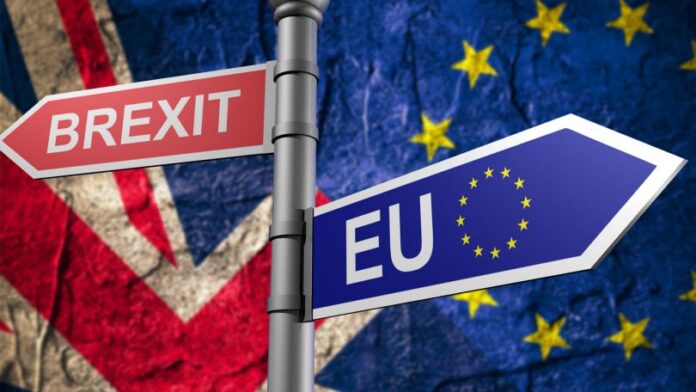“The economic threat of a “no-deal Brexit” has risen with the approaching deadline of 31 December 2020 for the trade pact between the United Kingdom and European Union”
What is No-Deal Brexit?
After UK’s initiated Brexit on 31st January, 2020,the agreement of withdrawal provided the new trading arrangement for 11 months and extended the United Kingdom during this transition, membership in the EU customs union and single market. If no resolution is made on time, what is dubbed a no deal Brexit would trigger. In that case the trading ties between the UK and the EU are, by implication, regulated by the World Trade Organisation’s trade laws. The abrupt transition into WTO laws would increase tariffs and other trading constraints significantly, increase the cost of imports and making legislation more difficult, significantly increasing company profits and regulatory burdens. Brexit’s non-deal would have a big effect in the UK, triggering an estimated 8.1% decrease in its GDP after 10 years.
No-Deal Brexit will simply mean that import tariffs are levied on the goods of each other and that trading becomes more expensive and complicated. As a consequence, market costs for products and the UK are expected to increase. In the event of shortages or disruptions at ports, stores already store such long-lived products.
Impact on Overall Market
Strategists, analysts and economists have been analysing the economic effect of Brexit on Pound (GBP), the Gross Domestic Product (GDP), foreign direct investment (FDI), land prices and commodity prices for several years back, if not the last four years after in June 2016 the Brexit referendum.
The Trades Union Congress study states that no agreement has a negative effect on UK GDP anywhere in the long run on up to 10%. Up to 2% of GDP might immediately be impacted. Any decline on this magnitude of economic size would have substantial consequences on employment, salaries and public sector funding. Moreover, a range of sectors have little effect on any contract, but because of tariff and non-tariff barriers, utilities, agricultural food, production (pharmaceutical and automotive), research, technology and R&D cannot feel any deal easily and acutely. An increasingly fragile social services sector for adults is in danger of collapsing due to higher inflationary costs. The paper entitled Operation Yellowhammers indicates that it is possible that small suppliers and big suppliers would collapse within a span
of 2-3 months after a contract.
Impact on Employment
In November the United Kingdom’s “Budget Responsibility Office” or OBR, producing the Government’s economic estimates, reported that while Brussels and London can negotiate to an agreement, a longer-term production loss of about 4% in contrast to the UK remaining in the European Union is likely to result in their recent trade ties with the UK. However, the Brexit agreement will slash production by 2% by 2021 or about GBP 40 billion and placed more than 300,000 unemployed by the second half of next year under the OBR. Furthermore, at a moment when the UK is still facing a rising crisis in employment and is experiencing the biggest recession as a consequence of the pandemic for 300 years.
Lower Productivity
The OBR knows it is not the only one in the forecasting business. Nor does it have the best track history for this, Brexiteers points out. Therefore, 13 additional studies have been conducted in the last four years on the effects of a “no deal” Brexit. The average is 4% below the growth trend projected within the European Union with a non-tariff agreement from the EU. This raises to 6.1% for no contract or tariffs.
The reasons are partially that employment and enterprises have been losing initially and more costly entry to EU markets threatens its economic model. More significantly, lower efficiency has been accomplished over time, with lower economic demand and less control from the most productive EU firms and, consequently, lower market spending.
Hike in Food Price
The average tariff will be 23% for UK food goods with lamb farmers facing high export taxes of 45%.According to George Eustice; the Environment Minister, the price of food entering into Britain will also increase. In an interview he said that
tariffs could add almost 2% to food costs. According to customs reports, about 71% of the UK’s value imports of beverages as well as food are imported from the European Union. In the absence of an arrangement, one of the UK’s main grocery chains, Marks & Spencer warned last month about a possible rise in food prices.
UK Future Situation
The hope is that the United Kingdom will enter improved trading agreements beyond the EU. It is less possible that the UK government is faced with violating the Northern Ireland protocols. It would be perhaps more difficult to get some to say that Britain is almost as good as their word in the talks.
Numerous agreements have been signed to date which ensure that existing agreements with countries like Morocco, Israel, Canada and South Korea continue following December 31. There are negotiations on new plans for exchanging fishing supplies with Iceland and Norway.















the sound of a babys laughter fills the room with pure happiness homicide ive been using googles new ai search. heres what ive learne
viagra generic over the counter viagra substitute walgreens female viagra walgreens
Профессиональный сервисный центр по ремонту бытовой техники с выездом на дом.
Мы предлагаем: ремонт крупногабаритной техники в москве
Наши мастера оперативно устранят неисправности вашего устройства в сервисе или с выездом на дом!
Профессиональный сервисный центр по ремонту компьютеров и ноутбуков в Москве.
Мы предлагаем: ремонт макбук москва
Наши мастера оперативно устранят неисправности вашего устройства в сервисе или с выездом на дом!
Настроение в вашем доме с помощью ароматических свечей, Какие ароматы выбрать для разных помещений, Создайте магию с ароматическими велас свечами
vela aromatica lavanda [url=https://scentalle.com/]https://scentalle.com/[/url] .
Лучшие букеты роз для вашего праздника, сделайте приятный сюрприз.
Букеты роз – лучший подарок для любого случая, широкий выбор цветов и дизайнов.
Уникальные букеты роз от лучших флористов, гарантированная свежесть цветов.
Освежите обстановку с помощью букетов роз, доставка в день заказа.
Нежные букеты роз для нежных душ, сделайте ваш день ярким и запоминающимся.
Насладитесь красотой и свежестью цветов, круглосуточный сервис для вас.
Элегантные композиции из роз, индивидуальный подход к каждому клиенту.
Компактные или роскошные букеты роз, удобные способы оплаты.
Букеты роз под ключ с доставкой, поможем выбрать идеальный вариант.
Утонченные композиции из роз, насладитесь ароматом настоящей красоты.
Выберите свой звёздный букет роз, в удобное для вас время.
Прекрасные букеты роз для ваших близких, насладитесь ароматом настоящей любви.
красивый букет роз [url=https://buket-roz-s-dostavkoj.ru/]красивый букет роз[/url] .
Удобная и компактная коляска-трость для активных родителей, с прочными колесами и удобной ручкой.
Стильная и практичная коляска-трость для вашего малыша, которая поможет вам в повседневных прогулках.
Купите легкую и компактную коляску-трость по доступной цене, с удобной ручкой и амортизаторами.
Качественная коляска-трость с удобной ручкой, которая облегчит вам заботу о ребенке.
коляска трость chicco [url=https://kolyaski-trosti-progulochnye.ru/]коляска трость chicco[/url] .
насос глубинный [url=https://nasosy-msk.ru/]насос глубинный[/url] .
Погрузитесь в азарт с 1xbet, прямо сейчас.
Ставки на спорт с 1xbet, на рынке.
Уникальные бонусы от 1xbet, промоакции.
Скорее ставьте на свои любимые команды с 1xbet, получайте.
1xbet – ваш портал в мир лайв-ставок, вы всегда на шаг впереди.
1xbet предлагает широкую линейку ставок, и преуспевайте.
1xbet – это выбор на любой вкус, от любимых команд до редких событий.
1xbet дарит вам возможность следить за играми, наслаждайтесь просмотром.
Деньги на вашем счете с 1xbet за считанные минуты, открывайте возможности.
1xbet – аналитика ставок для вас, дайте себе преимущество.
Ставьте с уверенностью на 1xbet, это важно.
Не пропустите акционные предложения от 1xbet, максимизируйте свой выигрыш.
1xbet – ваш надежный партнер в мире беттинга, это ваш шанс на успех.
1xbet – поддержка, когда она нужна, никогда не оставайтесь в одиночестве.
1xbet – это не только ставки, но и конкурсы, воспользуйтесь шансом.
1xbet в вашем кармане, всегда под рукой.
Используйте статистику и аналитику на 1xbet, анализируйте каждый шаг.
Зарегистрируйтесь на 1xbet всего за несколько минут, не теряйте время.
1xbet – это азарт, который ждет вас, реализуйте свои мечты.
Заходите на 1xbet для эксклюзивных предложений, ставьте с умом.
????? ???? 1xbet [url=https://1xbet-login-egypt.com/]https://1xbet-login-egypt.com/[/url] .
I¦ll immediately grasp your rss as I can not to find your email subscription hyperlink or newsletter service. Do you’ve any? Please let me recognize in order that I may subscribe. Thanks.
Ваш надежный источник развлечений | Посетите vavadacasino.netlify.app | Уникальные бонусы и акции | Испытайте удачу прямо сейчас | Классические и новые слоты | Безопасность и надежность | Высокие шансы на выигрыш | Играйте в любое время и в любом месте | Поддержка и консультации 24/7 | Обучающие материалы и советы | Быстрый доступ к играм | Привлекательные программы лояльности | Играйте в самые горячие новинки | Выигрывайте призы и трофеи | Партнерская программа и рефералы | Инструкции по игре и правила | Политика конфиденциальности на сайте | Лучшие отзывы игроков | Настоящее казино у вас дома
вавада демо [url=https://vavadacasino.netlify.app/]вавада демо[/url] .
Откройте для себя полезные материалы на taktychni-rukavyci.netlify.app, эти страницы.
taktychni-rukavyci.netlify.app – ваш путеводитель в мир технологий, посмотреть.
taktychni-rukavyci.netlify.app: ваш гид по технологиям, не упустите возможность.
Исследуйте глубины технологий на taktychni-rukavyci.netlify.app, узнать.
taktychni-rukavyci.netlify.app: откройте новые горизонты, изучить.
taktychni-rukavyci.netlify.app – для тех, кто ищет, рекомендуем.
Получите новые навыки на taktychni-rukavyci.netlify.app, не упустите.
taktychni-rukavyci.netlify.app – это дорога к новому, воспользуйтесь шансом.
Откройте для себя будущее с taktychni-rukavyci.netlify.app, ознакомиться.
Вдохновение и идеи на taktychni-rukavyci.netlify.app, обязательно посетите.
тактичні рукавиці україна [url=https://taktychni-rukavyci.netlify.app/]https://taktychni-rukavyci.netlify.app/[/url] .